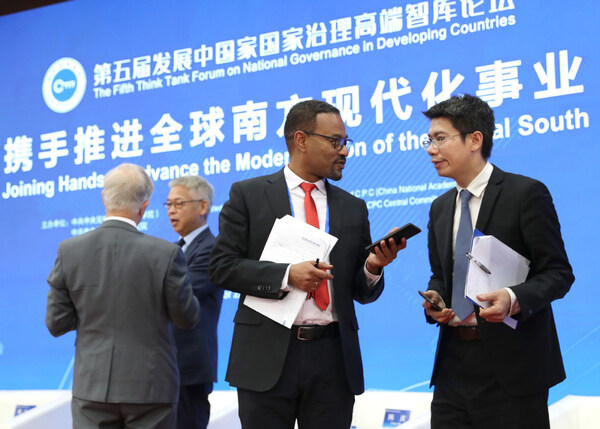BEIJING, Nov. 23, 2024 /PRNewswire/ -- China's rise from poverty to prosperity is a miracle that has contributed enormously toward global development, said Erik Solheim, former under-secretary-general of the United Nations.

Endalkachew Sime (second right), former state minister of planning and development of Ethiopia, talks with Zhou Taidong, vice-president of the Center for International Knowledge on Development at the Fifth Think Tank Forum on National Governance in Developing Countries in Beijing on Friday.
Speaking at the Fifth Think Tank Forum on National Governance in Developing Countries held in Beijing on Friday, Solheim said that Chinese modernization is rooted in its ancient traditions, which have developed through history and are hard to imitate. But the experiences still hold valuable lessons that other nations can learn from.
The forum, with the theme "Joining Hands to Advance the Modernization of the Global South", was jointly held by the Party School of the Central Committee of the Communist Party of China (National Academy of Governance), the Institute of Party History and Literature of the CPC Central Committee, Peking University and China Daily. More than 200 participants from 20 countries attended the event.
"What China offers is not just a model, it's now the source of main investment in the Global South," said Solheim, listing the Padma Multipurpose Bridge project in Bangladesh as an example. He said the project has helped the Bangladesh economy grow by connecting the country's east with the west. "And the railway and their stations built by China are an enormous service to Kenya, while the new port launched in Peru is important for trans-Pacific economy and South American economy," he added.
Speaking on the occasion, Xie Chuntao, executive vice-president of the Party School of the CPC Central Committee said the success of Chinese modernization had proved wrong the perception that modernization equaled Westernization. He added that China not only sets an example for other members of the Global South but also provides genuine help to them by writing off debts and taking other mutually beneficial measures.
"For this year's China International Import Expo, China reserved over 120 free seats for 37 of the most underdeveloped countries. This reflects the Global South's call for unity, development and reform and strengthens inclusiveness and sustainability," Xie said, adding, "It also meets the aspirations of the people of the Global South for a better life."
Commenting on the growth of the Global South, Qu Qingshan, president of the Institute of Party History and Literature of the CPC Central Committee, said: "With a population accounting for over 70 percent and economy accounting for over 40 percent of that of the whole world, the Global South has become an important engine for the world's growth. That countries of the Global South jointly moving toward modernization is an unprecedented miracle in the history of mankind."
Ra'ed Mohammed BenShams, president of the International Institute of Administrative Sciences, stressed that a moral basis must be laid for cooperation and called for "cooperation based on understanding" among nations, in particular among Global South economies. "It's time to foster collaboration grounded in mutual respect and shared values," he said.
"China has always regarded itself as being from the South. This is not just a geographical statement but also a philosophical position," said Donald Ramotar, former president of Guyana, speaking via video, "The leadership of the People's Republic of China has always based its policy and its relations with the developing world on the principle of solidarity, mutual benefits and the promotion of win-win cooperation."
Hong Dayong, vice-minister of the Publicity Department of the CPC Central Committee, hoped that Global South think tanks could deepen research into each other's history, culture and development path, thus promoting mutual understanding.
"Think tanks can provide a sound basis for Global South nations to write their own narrative of civilization," he said in a keynote speech. "Their voices can also be expressed in a better way so as to eradicate misunderstanding and misjudgment."
It's important for the Global South to have its own voice in global affairs, said Qu Yingpu, publisher and editor-in-chief of China Daily.
"World peace and development face severe challenges and regional conflicts, but on key global affairs and topics, the Global South nations are no longer the silent majority," he said in a keynote speech at the forum. "Instead they have their own voices and demonstrate more independent and rational viewpoints."
Tamas Hajba, head of the Organisation for Economic Co-operation and Development, Beijing Office, said that the world needs international cooperation and partnership more than ever. "Modernization of the developing countries is not merely an agenda; it is a necessity for achieving global stability, equity and sustainability," he said.
Endalkachew Sime, former state minister of planning and development of Ethiopia said: "The word South is derived from the word that means somewhere with sun. Literally the connection likely stems from the fact that in the northern hemisphere, the sun is generally in the southern part of the land. I believe the South is not poor, but it is the source of light."
source: China Daily
樂本健【年度感謝祭】維柏健及natural Factors全線2件7折► 了解詳情































